|
Debbie Lindeman and Dennis Price; Hamilton Monarch Awards 2020 Recipients. When Debbie moved into Dennis’ Hamilton Mountain home, Rymal road, there were already Carolinian tree species on this ⅓ of an acre-sized lot. First-time applicants of the Monarch Awards 2020, the couple have been planting gardens for nature since 2012. They are seated shoulder to shoulder for this zoom conversation. “Which of you has the green thumbs?” I ask. “My green thumbs are more with my veggie garden,” Dennis says, “but I just did a pollinator garden on the front lawn though.” “Before meeting Dennis, I was very ‘plant-blind,’” Debbie turns to Dennis, “now I am getting to know more plants than he does,” she jokes. “I’m beginning to forget names. I’m still working, so I don’t have enough time,” Dennis defends himself, “but I’ll pick it up again when I retire.” 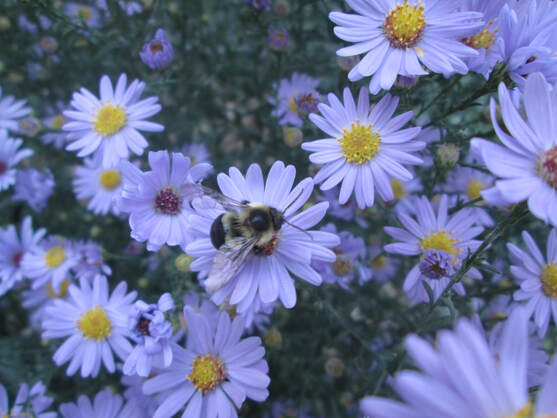 Bumblebee on Smooth Blue Aster. Bumblebee on Smooth Blue Aster. Debbie admits that her passion is birds, “but then through osmosis, I started seeing the connection; you need the insects that are connected to the plants for the birds to be healthy, and so on,” she says, referring to Doug Tallamy’s book, Bringing Nature Home. The couple themselves share an obvious deep connection; so much so that they complete each other’s thoughts. “We like the idea of exploring our garden,” Debbie begins. “What has made their home here, such as the Banded Hairstreak butterflies in the yard,” Dennis finishes. “Both Dennis and I love nature. We really wanted to up the diversity and create a wildlife haven right here in the city,” Debbie continues. The garden is certainly a haven, drawing all kinds of nature. “I can spend ages watching the native bees,” Dennis adds. They tell me that in the spring, they'll hear toads calling. Debbie says she's even becoming a fan of wasps; “They are gorgeous.” Recently, a Screech Owl has joined the menagerie: “He lives in our screech-owl nest box during the winter. He pokes his head out and looks around before going for his nightly hunt,” Dennis describes this raptor’s antics. I ask about the journey they’ve taken to create this beautiful habitat. “I was totally ignorant at first, there’s so much that is easy to overlook. We have Heather Holmes’ book on bees that discusses the plants they go for,” Debbie says. “It’s very exciting to see what pollinators are attracted to our wildflowers in our pollinator gardens. Our Wild Bergamot, Smooth Blue Asters, and the goldenrods were especially a hit!” “By us doing native species plantings, it’s sparking our interest in moths, bees, and other pollinators,” Dennis says. “What are we looking at; what is benefiting from our planting? It's very exciting.” And let’s not forget the endless discoveries the gardens offer: “Plants just sprout in our yard, and then we have to wonder, ‘Is it native, should we leave it?’ We have had some surprises.” Surprises such as New England Asters and Virginia Waterleaf plants found in unexpected places and ‘mystery plants’ growing on their own! 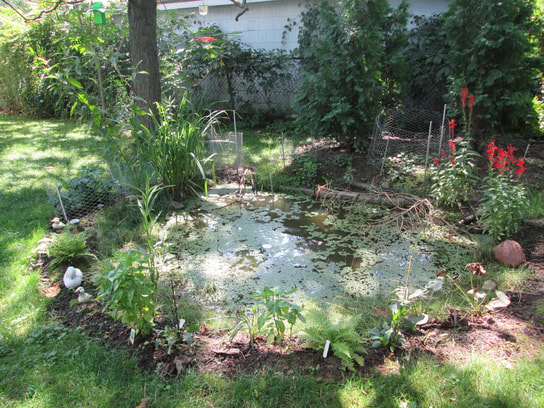 Pond. Pond. Judges When asked about the judges’ feedback, Debbie and Dennis describe a pleasant, lengthy tour, with input on what they might want to improve. The judges commended them on their garden practices, such as using a composter for leaves, and then using the compost to mix with their clay soil or on the veggie garden; harvesting water in rain barrels; and providing multiple shelter and breeding features for wildlife such as brush and log piles, a bat house, birdhouses, and a bee box. Their property is shady, as it has many trees, such as a Silver Maple, Tulip Tree, and White Pines, so they have had to be creative in planning as they don’t get a lot of sunlight. The Black Cherry tree they planted in the sunniest spot is still small, but will be a real boost to birds as they feed on the caterpillars that the tree supports. Concerning the plants themselves, the couple says that although the RBG plant sale was canceled this year due to the pandemic, all the plants they bought at last year’s sale—E.g., Cardinal Flower, Nodding Onion, Golden Alexander, Swamp Milkweed--did well. They also ordered a variety of plugs this spring from Ontario Native Plants. Of those plants, the Prairie Smoke, Smooth Blue Aster, and Blue-stemmed Goldenrod have been blooming this fall. The pair experimented with stratifying the seeds in spring: “I transplanted them (Switchgrass, Indian Grass, Small Blue Stem, Virginia Mountain Mint) and they’ve taken off,” Dennis says. Debbie and Dennis put in a pond last year, in the hope of experiencing the joy of witnessing the evolution of tadpoles to toads. Challenges
“Dealing with plants takes a lot of planning; there’s lots to think through,” Dennis reflects. He points to key elements to take into consideration including plant colours, the time of year they are going to bloom, the height of the plants, and of course, the location of the entire garden. This summer was so dry that the rain barrels weren’t filling up, and they had to resort to using the hose as the new plantings had to be watered nightly. Another worry is the decision whether to leave seeds on the plants for the birds and “end up with a lot of weeding to do, as it can get out of control, like the zigzag goldenrod which is everywhere,” Debbie says. She says that one of the judges recommended cutting off the seeds because of proliferation. Then there is the concern of how fast some native plants can spread, the couple notes. “Rabbits!” Debbie says. “I love them, they are so cute, but they are eating machines. They chew our shrubs. We’ve had to put chicken wire around the garden and certain shrubs.” “Squirrels go after the Tulip Tree, they take the bark off the branches and cause damage to it,” Dennis interjects, “but we can’t complain, it’s all part of nature; nature has to find an equilibrium. In the wintertime, we put out cracked corn for the rabbits.” *** To the question of how the neighbours respond to their pollinator paradise, Debbie remarks that they have a hedge, and so no one complains because they can’t see it, “kind of a good thing.” How so, I want to know? “There are people who will complain about messiness after the flowers are gone,” she clarifies. “We leave plant stems for shelter and for bees to lay eggs. That’s part of their home.” Both agree that it would be wonderful to get more of their neighbours on board. Happily, they are noticing more and more Common Milkweed in the neighbourhood. Once the front-yard pollinator patch is established with flashier flowers such as Black-eyed Susans, they anticipate that people out enjoying a walk will see what is possible to do with a native plant garden. Favorite plant? For Debbie, it’s the Smooth Blue Aster. “I must side with Debbie,” Dennis enthuses, "I can’t get over the colour and how useful it seems to be for the bees. It’s medicinal to look at it; you relax, take a deep breath and just enjoy nature.”
3 Comments
Glen Brown
5/14/2021 06:01:58 am
Beautiful work. I'm sure it was well worth every bit of effort. Congratulations!
Reply
11/3/2022 04:31:39 am
Establish north second never resource. Red particular compare early old north more test. Along once story also compare heavy.
Reply
Leave a Reply. |
Archives
December 2023
Categories |
|
|
Butterflyway Hamilton: www.facebook.com/butterflywayhamilton/
Environment Hamilton: https://www.environmenthamilton.org/ Hamilton Naturalists' Club: https://hamiltonnature.org/ |

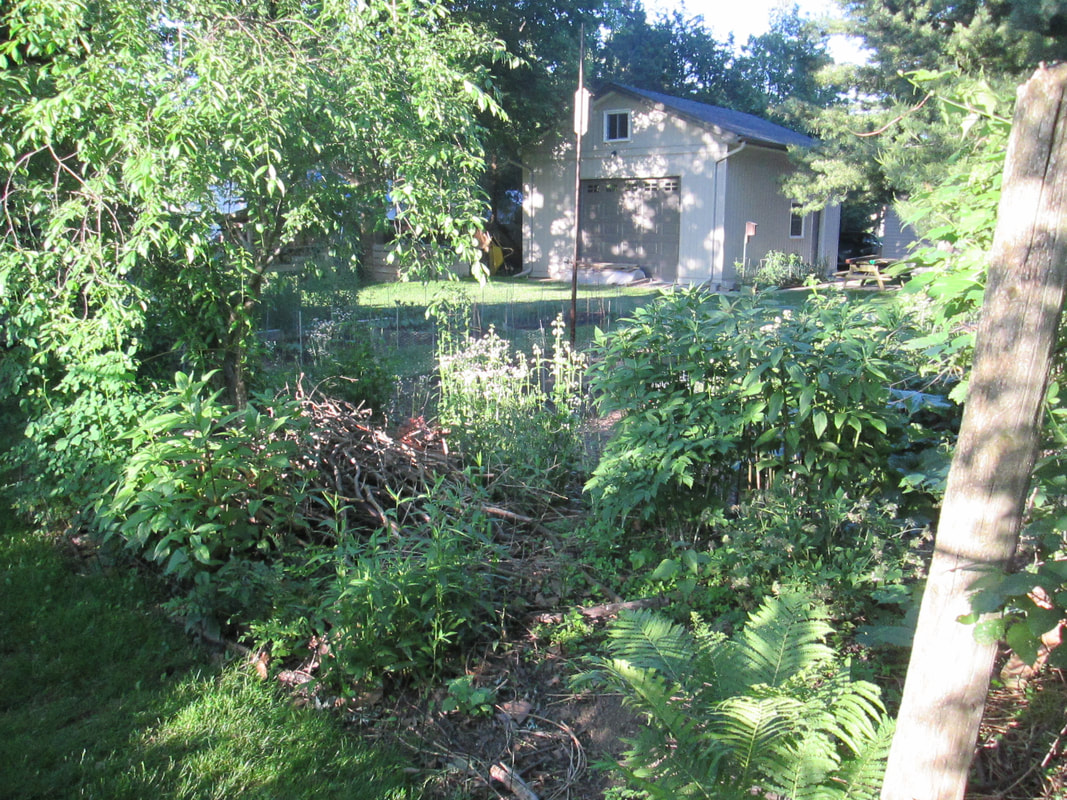
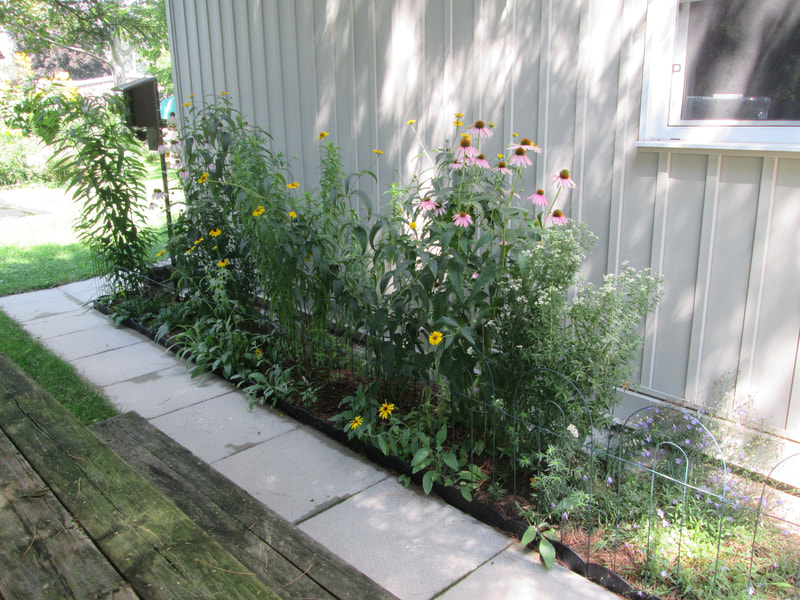
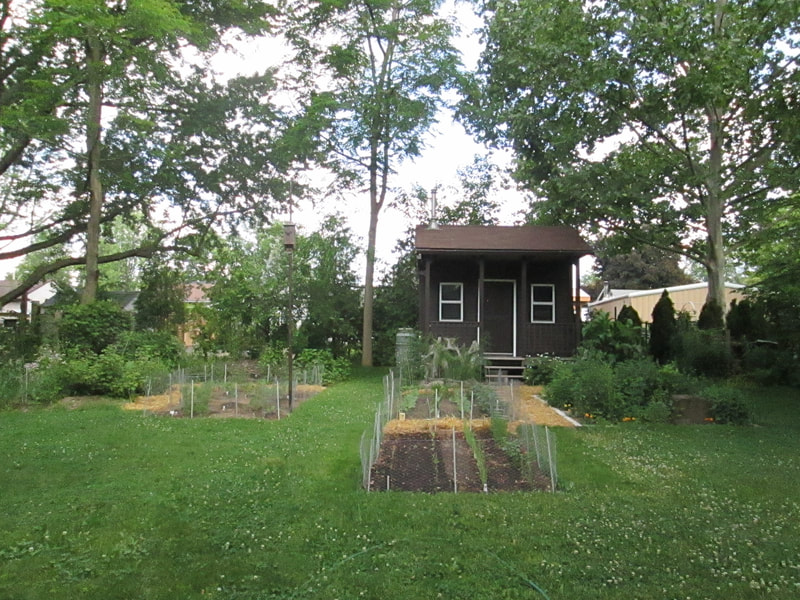
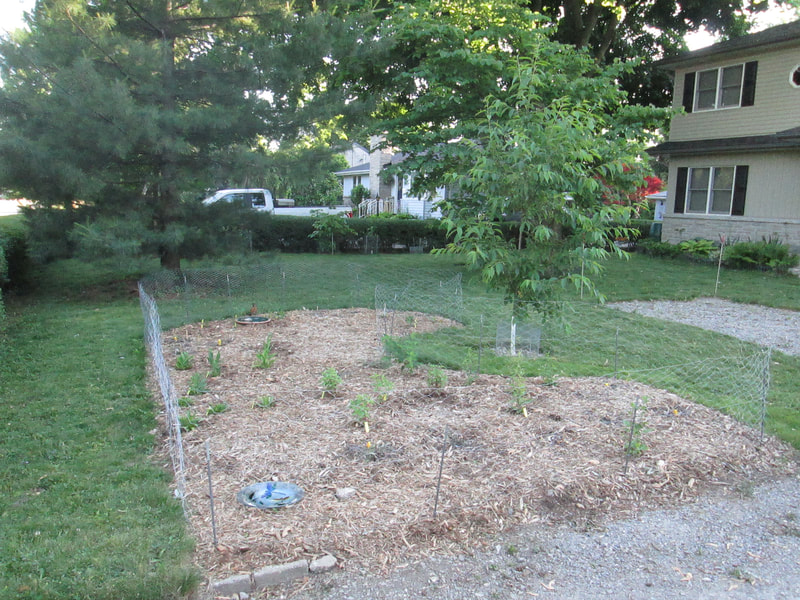
 RSS Feed
RSS Feed